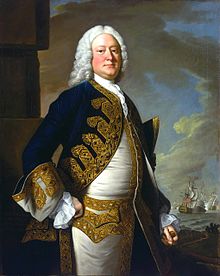John Byng

John Byng (* 1704 , baptized in Southill, Bedfordshire , October 29, 1704, † March 14, 1757 in Portsmouth ) was a British admiral and politician.
Life
John Byng was the son of the future Admiral George Byng and entered the British Navy in 1718 , initially stationed in the Mediterranean . In 1724 he became a lieutenant and in 1727 captain of the frigate Gibraltar . In 1742 he became governor of Newfoundland , trying in vain to oppose monopoly trading practices by local merchants. In August 1745 he became Rear Admiral (Rear Admiral) and commanded a flotilla against Scotland , which from the sea replenishment and reinforcement for the Jacobite uprising Charles Edward Stuart should stop. In 1747 he was vice admiral and again stationed in the Mediterranean. From 1751 to 1754 he was a Member of Parliament for Rochester .
In 1756 he was sent to the Balearic island of Menorca to defend the island and in particular the Castillo de San Felipe de Menorca , at the start of the Seven Years' War , against the French , who were now under the leadership of the Duke of Richelieu with 15,000 men had already landed and were besieging the fort. Byng suffered a defeat at the sea battle of Menorca on May 20, 1756 with an approximately equally strong French squadron under the Marquis de la Galissonière . His leading ships were badly damaged when he attacked in line, while the French broke through with minor losses. The battle was Byng's first command in a sea battle, and even as a captain he had little experience in the field. He declined a suggestion by one of his officers to leave the line in order to engage more of his ships in the enemy, since a similar approach at the Battle of Toulon in 1744 had cost Admiral Peter Mathews the command and resulted in court martial proceedings for some of his officers .
Byng stayed a few days off Menorca but was unable to establish contact with the besieged fort and decided to retreat to Gibraltar to have his damaged ships repaired. There, however, he was relieved of his command. Minorca fell into the hands of the French shortly afterwards, causing public outrage in Britain. The Prime Minister, Thomas Pelham-Holles , publicly stated that he would indict Byng and hang on to it immediately. Byng was tried on a court martial in December 1756 and January 1757. He has been charged with several offenses, including cowardice. In the end, there was only one conviction for non-compliance with the Fighting Instructions , for which he was sentenced to death . On March 14, 1757 he was in Portsmouth on the HMS Monarch shot . The decision was controversial, and several well-known personalities such as Horace Walpole and William Pitt the Elder campaigned for a pardon, a recommendation that the court-martial itself had made. It was also suspected that the Admiralty and the government were trying to divert attention from their own failures with the judgment.
The judgment was subsequently understood as a warning for admirals of the Royal Navy to show unconditional commitment in the event of war. Voltaire expressed this in his novella Candide, or Optimism : the English found it necessary from time to time to shoot an admiral in order to encourage others (pour encourager les autres).
Byng was buried in Southill. As recently as 2007, his descendants tried in vain to obtain a revision from the British Ministry of Defense.
literature
- Reliable life story of the British Admiral of the White Flag, Johan Byng, who was shot dead on March 14th 1757 on the board of the monarch's war ship. In addition to a brief preliminary report on the current constitution of British sea power. sn, Frankfurt a. a. 1757, online .
- William Laird Clowes: The Royal Navy. A history from the earliest times to the present. Volume 3. Sampson Low, Marston and Co., London 1898 (reprinted: Chatham, London 1996, ISBN 1-86176-012-4 ).
- Peter Burke: Celebrated Naval and Military Trials. WH Allen, London 1866.
- Byng, John . In: Encyclopædia Britannica . 11th edition. tape 4 : Bishārīn - Calgary . London 1910, p. 896 (English, full text [ Wikisource ]).
Web links
- Biography. (English)
- On the trial and execution of Byng from William Laird Clowes The Royal Navy (link is dead. Retrieved March 14, 2020)
- Karen Guest Whitehurst: Article on Byng and his trial. (the link is dead. Accessed March 14, 2020)
- Due to failure - Admiral was shot
Individual evidence
- ↑ Before that, martial law had been tightened so that officers of any rank could be punished with death if they did not show unconditional commitment in combat or in pursuit of the enemy. In 1745 a young lieutenant was sentenced to death for this, and his ship was captured by the French. His captain had previously fallen but was convicted in the court martial only for neglect of his duty, which sparked outrage in Britain at the time.
| personal data | |
|---|---|
| SURNAME | Byng, John |
| BRIEF DESCRIPTION | British admiral and politician |
| DATE OF BIRTH | baptized October 29, 1704 |
| DATE OF DEATH | March 14, 1757 |
| Place of death | Portsmouth |
